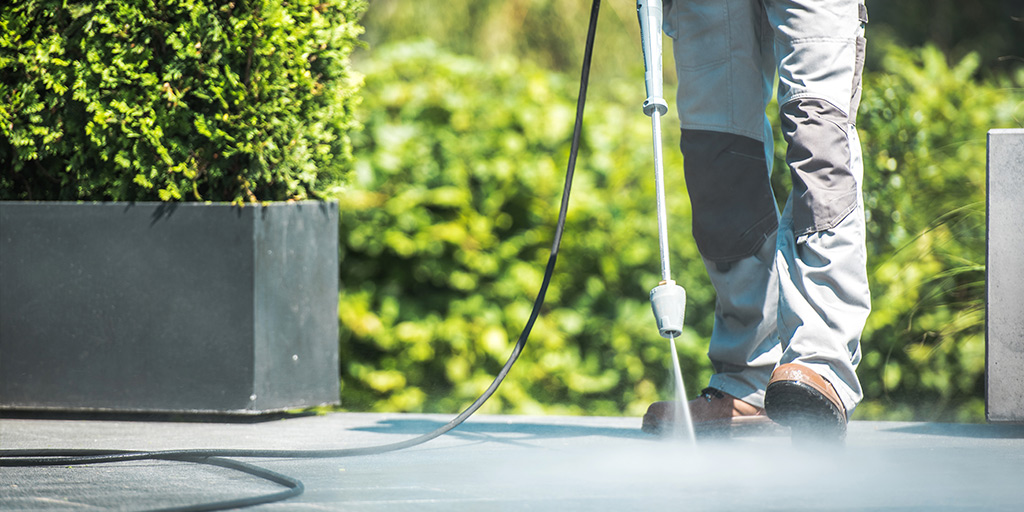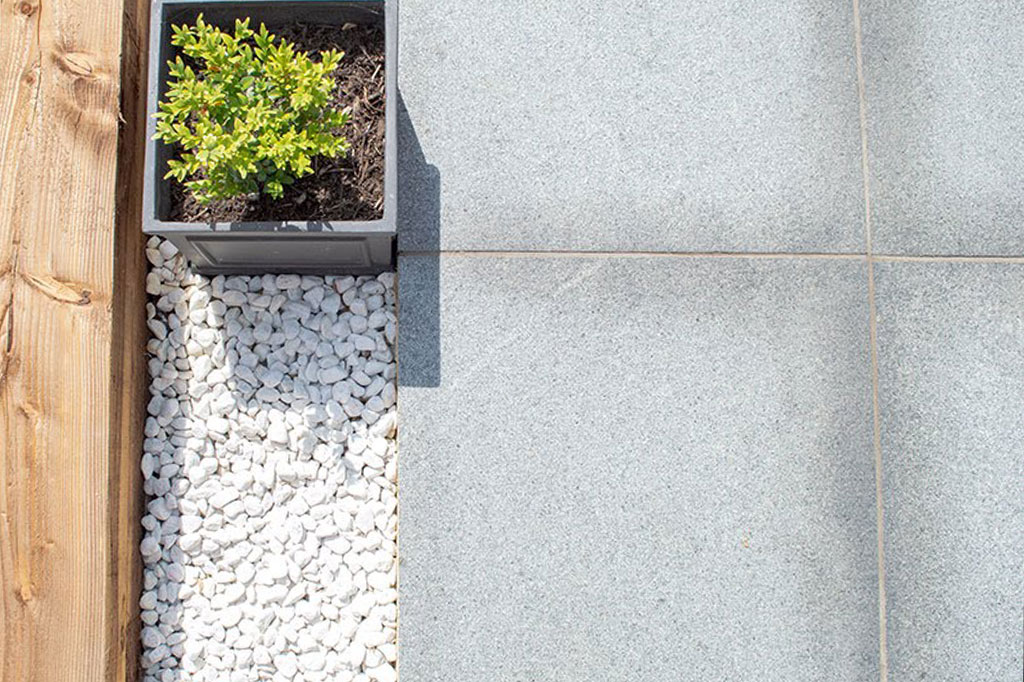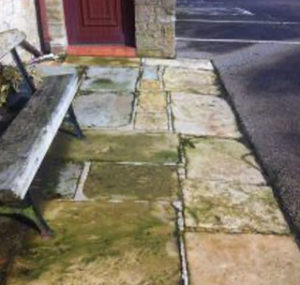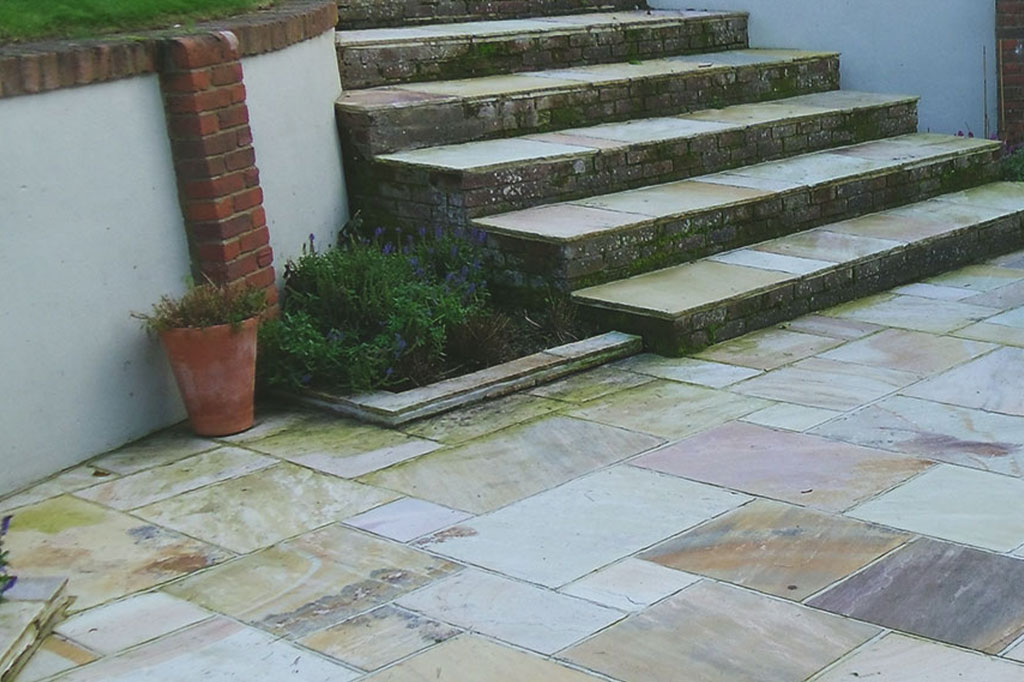The foundations of a good cleaning regime for your paving can be applied to any paved area regardless of the paving material. If you undertake a basic cleaning regimen regularly for your patio area you may not ever need to use harsh chemicals except for perhaps some minor incidents of spillage or bird mess that is particularly stubborn. A good process for cleaning almost any paving is as follows;
Use a light detergent
Ideally use a stone safe cleaning detergent like one of the products we stock at Forest Stone – we can recommend Lithofin Power Clean for use on all stone and porcelain paving. However where you do not have access to a specific cleaner you can use washing up liquid mixed with warm soapy water. Remember that some stones, such as Limestone, are very sensitive to differing PH levels in chemical cleaning detergents- using the wrong detergent could result in permanently creating marks or discolouring your stone paving. Always check the manufacturer’s guidance and if in doubt check in with one of our team for technical advice.
Apply & Agitate
Soak the paved area in your cleaning solution and allow to settle in to the paving surface as per the manufacturer’s instructions (if applicable). Once the solution has had time to work into the paving and before it dries you should further agitate it with a stiff brush or similar. This should loosen the surface debris and remove it from the paving.
Pressure Wash & Rinse
Now pressure wash or hose down the paved area to remove the debris and dirt completely from the paving’s surface. It’s not necessary to use a pressure washer but you’ll likely achieve a better result when doing so. However you should always keep a distance of around 50cm from the paving and take extra care around paving joints so as not to damage them when cleaning. Don’t be tempted to go closer than the recommended 50cm and if there are stubborn stains you should consider removing them with cleaning chemicals and brushes or wools rather than a power washer. Once dried you should be looking at a lovely clean patio once more!

Regular periodic cleaning is a far better approach than a more intensive annual clean.
Cleaning stone & porcelain a few times a year can keep the task light and your paving clean.
Algae, Mould & Plant Growth
Regular light cleaning as described above can prevent a lot of organic debris build up on your paving however some stone paving flags are more susceptible than others when it comes to the build up of mould and algae. The surrounding plants, lighting and weather conditions also play a part. If you’re paving does have quite a degree of organic growth you’d like to clean off then using a basic stone-safe all purpose cleaner (with perhaps a stronger solution in troublesome areas) as directed by the manufacturer normally will do the trick. Again we can recommend Lithofin Power Clean in these situations. If this doesn’t work start looking at stronger more specialist cleaning chemicals, like Lithofin Builders’ Clean, but always bear in mind the paving you’re working with and how it may be affected by the chemicals you select.
-

Algae build up on old sandstone -

Moss growth on sandstone
Oils, Drinks & Chemical Spills
If you’re unfortunate enough to spill oil, fat or any kind of liquid that will leave a stain you should ideally remove it as quickly as possible using some kind of absorbent cloth, towel or even tissue. Clean any residue left with a stone safe detergent and stiff brush and rinse away with clean water. Don’t be tempted to use a power washer on a mark like this on stone paving as you can actually push the stain deeper into the pores of the stone making it almost impossible to remove. If this doesn’t achieve the desired results then you may have to consult one of our team on how best to remove the remaining stain and take into account your paving material as this will effect what cleaning agents you can use. Generally porcelain paving will be easier to clean as it is not very absorbent at all and can withstand powerful cleaning agents interacting with it whereas stone has a varying absorbency levels and can be sensitive to cleaning detergents. If in doubt contact a specialist or one of the team at Forest Stone and we can advise you.
Rust Marks
If you’ve had metallic objects in contact with your paving you can get rusty marks appear. If you catch these early they can be cleaned with a mild cleaning solution however if they have become engrained you’ll need a specialist cleaning detergent designed for this kind of stain – contact our team for advice on this.
Mineral Marks on Natural Stone
Some natural stones can have iron ore and other coloured minerals within them. Over time these minerals can ooze out of the top surface of the stone. They can look like topical stains but actually they are the stone breathing out its mineral deposits. These can be cleaned with a specialist detergent but they will re-occur until the minerals have all left the stone. Generally this is something people have to live with – after all this is a natural product and comes with all of natures characteristics.
Efflorescence
You may notice swages of white salty substance on your paving – this happens particularly with sandstone. These marks are salts that are oozing out of the stone as it matures. These can be cleaned off with a specialist cleaning detergent – contact our team for advice on the right product to use.
Cement Marks
It’s best to try to keep your paving free of cementitious debris but during construction it can be very difficult. If you do find you’ve spilled cement on your paving or the edges of your paving have been marked by the jointing material, sometimes known as picture framing, there are several cleaning chemicals you can use to remedy the situation. What you use depends on your paving choice so consult our team for some assistance on this.

Sealants
Porcelain paving does not need to be sealed at all although you may want to seal the jointing material to make that easier to clean and maintain in the future. Most stone paving materials, especially sandstone, could benefit from the protection of a good quality stone sealant. This is an area not to skimp on as a ‘cheap’ sealant can wear very quickly and need re-applying so regularly that it really is not cheap in the long run. We have a whole host of options on sealants so speak to one of our team to get the latest advice and availability on products.
Remember- do your research before applying any cleaning chemicals to your paving and always consult the manufacturer’s guidance before working with ay cleaning detergent.







